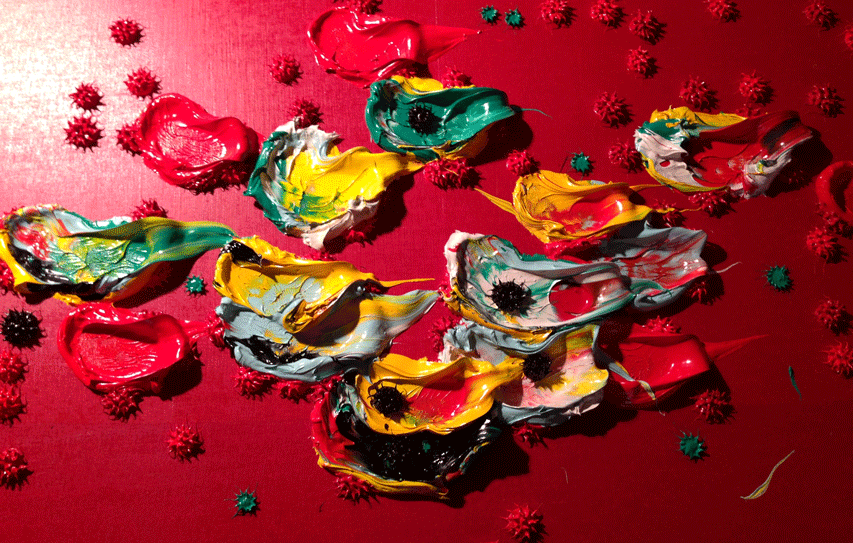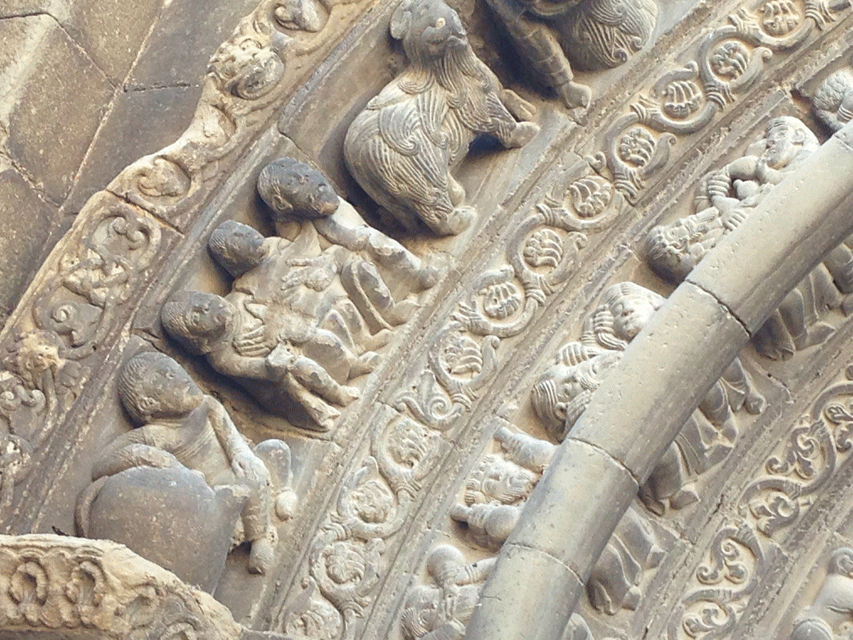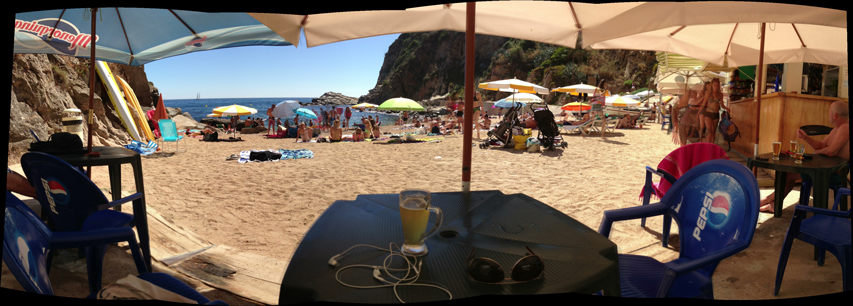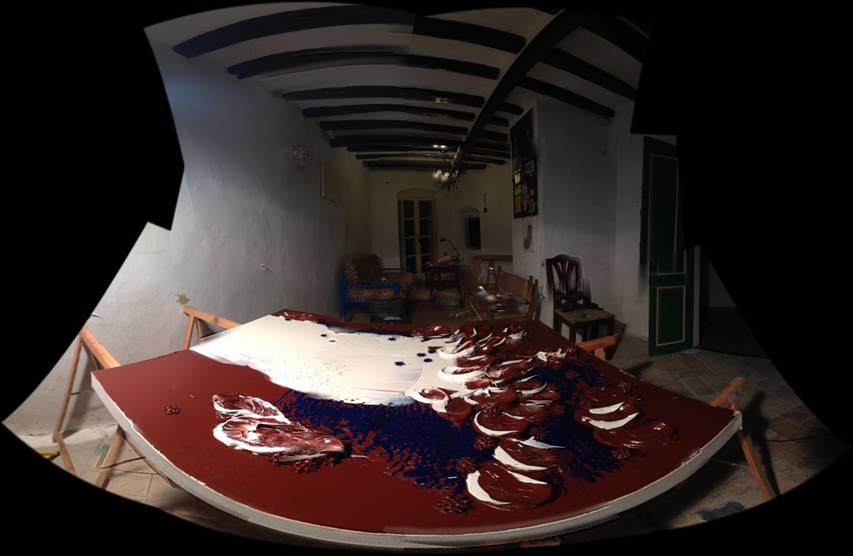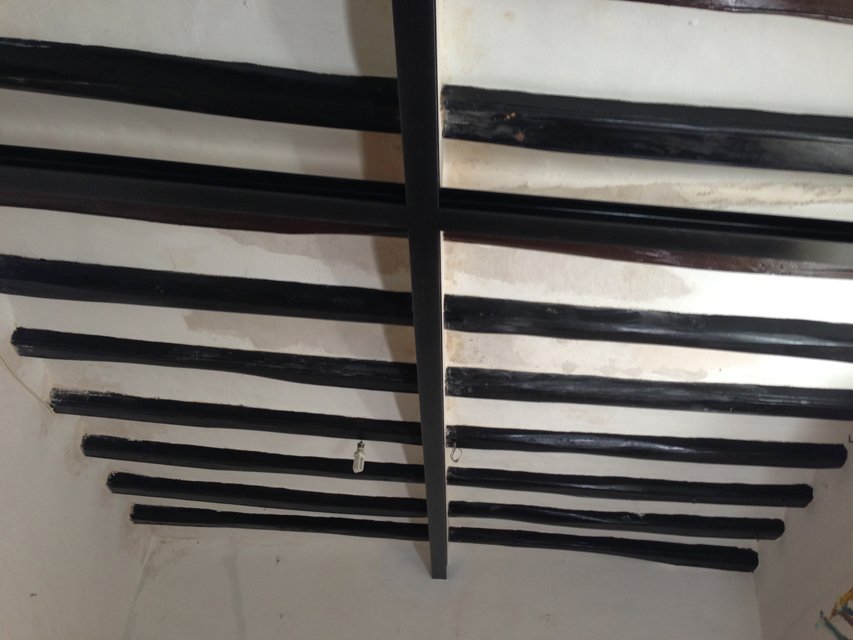August 29, 2013
Flashback: Beyond the Beyond
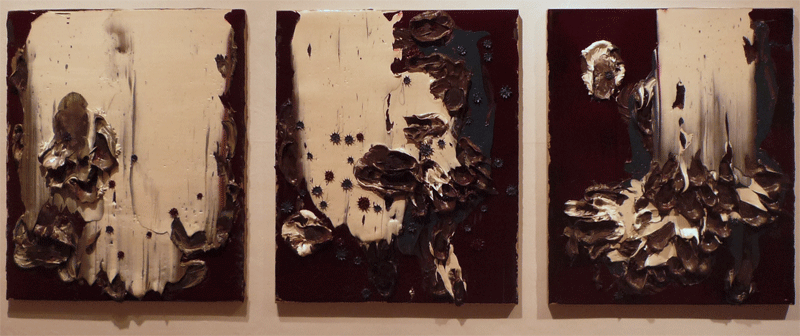
While in Spain, I was thinking about a triptych I painted in 2008, titled "Beyond the Beyond". I painted them on my return from a summer in Spain.
I wanted to do it again.
Bigger.
August 20, 2013
Kiko and Carlos in San Felíu
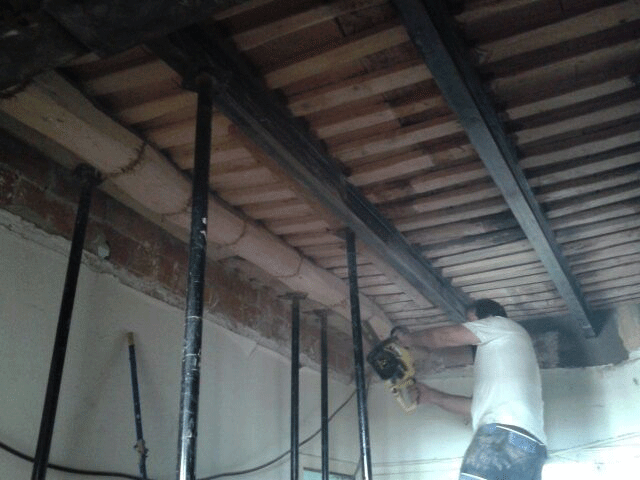
My doorbell rang. I was trying to sleep off a late night, one of several links of a weeklong chain of reunions with several friends after having returned to Spain, to our house in Tossa de Mar, a former fishing village on the south end of the Costa Brava. Looking at my watch, it was only 7:30am, only three hours earlier had the night ended, early in terms of the custom in this part of the world. Stumbling downstairs, my head hurting, I squinted into the morning light as I opened the door to the big smile of Kiko Noguera: "Let's go to San Felíu today! We will change some beams! Then we will go for a snorkel afterwards, bring your gear. What do you think?"
It's been a long time since I last saw Kiko, a bit less than a couple of years. We've been weathering the crisis each in our different parts of the world, his side of it had been tougher than mine, Spain's economy had been in free fall and only now has there been an apprehensive sense of reprieve. Kiko works in construction, a general contractor in American parlance. He had become a specialist of a sort in dealing with old buildings, given that that is mostly all there is to work on north of Barcelona in the form of historical villages nested in the crags of the Costa Brava coastline. Kiko reformed my house in Tossa de Mar, that's how we got to know each other. I was lucky to encounter straight off the bat, a builder with integrity and commitment, as well as a warm, entertaining and promiscuously provocative character. We became fast friends, he was my ambassador to the Catalan culture that caught me by surprise. To a Yankee, the division of Spain into four mutually repellent nominally autonomous territories is hard to comprehend. My wife and I thought, only dimly at first, that Spain was Castile and the other aspects of it were minor variants. How wrong we were. I now only know Catalunya and I'm not sure of what I thought I knew of Castile. Where the latter could be Quixote, his head poetically in the clouds, the former would be Gaudi, his feet planted and growing into the earth.
Earlier in the week, Kiko was describing to me his new team of workers. The cast of characters that stream through his job sites has always been fascinating to me, a kind of character cross section into a specific sector of Catalan culture. Occasionally, there are the skilled, experienced and more than competent. But this type is moving on to their own business venture quickly. Usually, there is the type of worker who is either there to learn or who is there because that is all that they can do. Of the latter category, there are those who are limited by choice and there are those who have no choice. This time, Kiko had two workers contracted with him for a reformation of an old house in San Felíu de Guixols, about fifteen miles up the coast along a winding road that is locally described as having as many turns as there are days in the year. Carlos owns a bar in Tossa, and since the tourist season is short, he wanted to supplement his income from the bar with construction work, double timing his workday in the process. Kiko described him as a guy who works well enough when the boss is by his side, but when alone, the pace inevitably slows to a crawl. There was another guy that he referred to as The Polock, a denomination which if used in the USA would be potentially offensive but as far as I can tell in Spain, is devoid of cultural prejudice. The problem with this particular (with emphasis on the specifics) Polock was that he was lazy. He could usually be found in the local Bar Josep, playing the slot machine and drinking pints of beer. Overweight with a belly that looked like that of a pregnant woman with triplets, it was no surprise to me when Kiko said that he claimed to have lumbago, a pain in his lower back and that he was frequently missing work, often without any advanced notice. Hearing this, I spontaneously told Kiko that I would volunteer to work in his place, all he had to do is knock on my door. And on this day, he did just that.
Kiko was lucky to have this job in our worldwide financial recession. Spaniards usually keep their August months dedicated to vacations, and so it is a marker of importance to see Kiko scheduling a project in the part of the calendar usually reserved for the service of joie de vivre. The project involved the replacement of a wooden beam structure with that of steel. Imagine replacing the bones of your skeleton with that of something synthetic, and you might have a good understanding of the delicate nature of this particular job. Buildings in this part of Spain, perhaps the whole of Spain, were built historically of stone and wood beams, large pieces of wood of about a foot in diameter. Walls are laid and the beams are inserted into the walls at every floor level upwards. The spaces between the beams are either spanned with shallow arcs of brick or 1x4 strips of wood that in turn support short flat hollow core clay tiles, which in turn forms a stable layer that would support an inch or two of cement for the floors or roof above. Kiko has hundreds of metal jacks in storage for just this sort of job and with these, he creates a forest of temporary structure that takes up the load of the building as he replaces the existing wood beam system one at a time with steel I-beams floor for floor. This was the job this summer in San Felíu.
So here he was, Kiko, standing at my door with a big smile and an extra helmet in his hands for our scooter ride to his furgoneta or van for the ride to the job site. My hangover wasn't crippling and I was still jet lagged so that the loss of sleep wasn't a big deal anyway, so with my earlier promise to help out still in force and in mind, I instinctively agreed and hustled on an old beat up pair of sneakers and jumped on the back of his scooter. We rode up the hills and found his furgoneta, beat from innumerable job schleps over time, and we drove first to a cafe in the middle of town to have a cortado (small coffee with a shot of steamed milk) and to pick up Carlos. Carlos was late, arriving with a half smile that seems to be for him, a permanent expression of mild amusement. He was late because he closes his bar at 4am. Tucked into a corner of the old part of town, Carlos' bar seems to be a magnet for the kids, late teens and twenty somethings. Low ceilinged, the entrance hidden by a crowd of overgrown potted plants, it seems to be a great place to hide away from the older folks and to compress one's attention on another. We waited a bit for The Polack, but after a cell phone call, Kiko found that his lumbago prevented another day at work.
We tumbled into the furgoneta and started the curvey ride up the coast to San Felíu. Kiko at the wheel, Carlos next to him up front, I was in back holding on to anything I could since Kiko was not going to give my hangover a break. His objective was not to waste any time on the drive no matter how many curves there are along the way. G-forces changing hands left and right, I thought of employing my method of handling car sickness: lay down and close my eyes. This used to work when traveling with my family across the states, but I thought better of employing, best not to convey any lack of commitment for the team. Cracking jokes, knowing probably that I was barely hanging on, Kiko pressed the slow traffic, threatening to honk his horn but resorting to loud whistles out of his window instead, he passed as many as he could and told stories along the way, usually about the work to come.
Just short of my breaking point, we arrived at the seaside port town and found the front door of the job site, a building in the thick of the town, the street that it fronts is probably not much more than twelve feet wide, about two or three blocks from the beach. We stashed some building materials inside and Kiko zoomed off and back to park the furgoneta. Before work, we had breakfast: small sandwiches and small beers at one of the cafes that mark one of the bigger shopping streets in town. People streamed by and more than a few were familiar to my co-workers -more opportunities for humor and some innocent flirting- the intensity of which was a gauge for me as to the length of the project. A cortado finished the session and off to the job site we walk, only a block away.
Carlos and Kiko went up to the third floor and they instructed me to help haul up buckets of sand via a rope and pulley out of the upper window above. I waded into the job, the hangover beginning to dissipate. The sand was in large vinyl sacks of which I had no idea how they got them inside the house since there was no space for maneuvering a forklift and the weight of each was immense. Shoveling sand into the buckets, I hauled them out front and hung each on a hook at the end of the rope. Pulling like a sailor , Carlos dropped hints as to how to pull easier (away from the building) and when to avoid the passing car traffic. Five or six buckets and a few metal jacks, I was asked up to the third floor to begin the task of the day.
Kiko was already up on the scaffolding in one of the four rooms on the upper floor. Carlos took me over to the mixing box and with brisk instruction as to the mortar mix (two buckets of sand, a little less than a half a sack of cement, a dash of water, mix with a long handled trowel) and also as to the identities of the various clay tiles and bricks that they will ask me for (all mass produced rectangular hollow clay items, a hero is fat, a tocha is medium sized with centered holes and a racilla is thin, almost a tile). Carlos, with his permanently amused smile, quizzed me quickly for comprehension, pointing to each and asking for the names. Satisfied, he jumped up to the scaffolding and Kiko asked for a jack.
Carlos didn't want to put up another jack, thinking that Kiko was too cuidadoso. Kiko did and began to display his irritation, "If the ceiling falls down, this will cost me money! You can't be too careful with a job like this!" Carlos always just want to the job to get done. The jack went up anyway, already in a room filled with them. Two jacks were placed at the middle of a beam. Carlos asked for the chain saw, and I hefted it up to him. Three pulls and in position between the jacks, he began cutting the existing wood beam, rocking the saw, careful not to run the blades on the clay tiles above lest they blunt the edges. I mixed concrete in the meantime, trying not to make it too watery or too dry. As the beam was freed of itself, the chain saw was shut down and placed aside as Kiko and Carlos carefully pull out the beam fragments first on one side and then on the other, careful not to punch out a hole into the exterior wall as they did so. Handing the beams to me, I took them and stacked them in the adjoining room. Carlos was planning to use them for firewood for the coming winter.
Kiko and Carlos asked for buckets of mortar. Buckets for this kind of thing in Spain are made of flexible rubber, something I don't see stateside, it makes sense when you remember that one material is pliable and the other is stiff and brittle. Kiko and Carlos placed a steel beam where the wood one was, hand screwing jacks in position, the accuracy of which was by eye and approximate. I filled the buckets with mortar and handed them off. Each had trowels and board to temporarily load the mortar, they flipped mortar into place with flicks of the wrist. Carlos was good, Kiko was better, flinging lumps of plastic mortar into the crevasses between the beam and ceiling and walls with the skill of a jai alai player. Both worked fast and one worked fast and cleaner, Kiko that is. Both asked for clay tiles like doctors in surgery: "hero!... racilla!...tocha!" and I would repeat the new words, trying to implant them in my head. They took each one and shaped them with swings to their trowels to break them clean and fast, inserting the fragments into the voids. As the beam was firmly set in position, they cleaned their tools in a bucket of water I handed them and moved the scaffolding to the next position to repeat the process again and again until the room was done. Sweating into the hot day, I handed them water to drink and water to clean their tools. And as the job was nearing completion for the day, Kiko went over each beam first with a trowel to smooth surfaces and then with a sponge to clean off cement off the beam so that they can later paint them easily. Carlos was done, but Kiko wasn't. I wish I could remember the jokes they were cracking to one another, the subject of which was about how hard an employer Kiko was to work for.
It was a short day, a kind of tourist's day on the job, courtesy of Kiko. He was generous to show me what his work was like. We ended about 3:30pm, cleaning up floor for floor until we were down the stairs and out the door to walk to a restaurant down the street for a late lunch. We took a table outside under cover and Kiko selected a seat to survey the passersby for commentary and greetings. The waiters came over one by one for hail and hearty greetings, but since the manager scolded them earlier for spending too much time with Kiko the raconteur, they soon stepped back to a respectful distance. We each selected items fro the first and second courses from the fixed price menu and soon we were plying the repast in turn.
Since Carlos didn't like swimming very much, he was planning to rent a paddle boat. I did my best to warn him away from it in my crude Spanish, saying that he might not like pumping the pedals for the time needed to get to the spot that Kiko was indicating for the swim. But Carlos wasn't going to listen despite how much I decorated the idea of laying out on the beach in the sun. Between bites, Kiko teased Carlos, probably knowing how much work he was going to do on the paddles to come. And even though Carlos wanted to get back to Tossa sooner than later for a nap before his work behind the bar, he acceded to the swim aspect of the day most probably because I was involved and Kiko wanted to fill out a robust experience for me, the gentleman he was. But Kiko is a notoriously slow eater. Watching him prepare his dishes with various cutting, salting, oiling, mixing, Carlos was usually done with his dish before Kiko had taken his third or fourth bite. The teasing and humor that followed this in train was unrelenting. Despite how much Carlos illustrated how tough it was to make it to 4am without his siesta, Kiko was going to have none of it. It was summertime and the train of pleasure and amusement must roll on no matter what. There must be something in the Spanish character that I have seen in nearly all citizens in that country that values a "go for gusto" ethos, compelling the intense compaction of pleasure into each unit of time as actualized in these two men and thus allowed Carlos to tolerate the compression of his schedule. Maximum pleasure must be had.
After cortados, we found the furgoneta and changed to swimsuits, grabbing our snorkel gear and walked to the paddle boat rental part of San Felíu beach. Soon we were off, Kiko sitting atop the fiberglass kiddie slide like a ships captain and pointing us in the direction that we were to paddle to. The bay is a deep shelter, perfect enough for a small beach and a harbor and because of this geography, the preferred snorkel spot was nearly to the point of the open sea. So we cycled our legs and images of Roman triremes floated in my mind, of mechanical repetition and a horizon one could never quite reach. Carlos is younger than I but not as fit, so we stopped a couple of times along the way. But by and large, he was stoic, always with a faint amused curl of a smile on his face. Reaching our destination, Kiko and I suited up and fell over into the water, each with capture bags for the limpets that Kiko loves to harvest from the rocks. San Felíu bay is relatively robust in marine life, compared to Tossa. We saw a great deal more limpets and octopus there than we have seen in Tossa now for many years. For Kiko and I, it's our policy not to kill the octopus -many do to our dismay- but we do play with them, however. Usually you can see them if they aren't already out in the open, by spotting their eyes looking at you from within a cavity in a rock face. Coaxing them out into the open with a prod, they squirt jets of ink and either take up a defensive position with a magnificent sprawl of arms on the rocks or try to swim out in a sprint as they elongate into streamlined shape. It was at this moment that Kiko grabbed one octopus and brought it to the paddle boat and flung it into the cycle well occupied y Carlos' legs. Non plussed, he merely raised his legs as the octopus dropped back into the shallow water not yet bailed out to the foot well, his faint smile not increasing or decreasing one iota.
Paddling back, our bags filled with a modest haul of limpets, we returned the boat and gave the shellfish to the restaurant to be eaten by Kiko and crew the next day. And not long thereafter, we were on the road back to Tossa, winding as many turns as there are days of the year, collapsing the day back to where we started and making plans for the evening, big plans, grand plans that might or might not be later realized.
August 17, 2013
August 15, 2013
Sniper Surprise
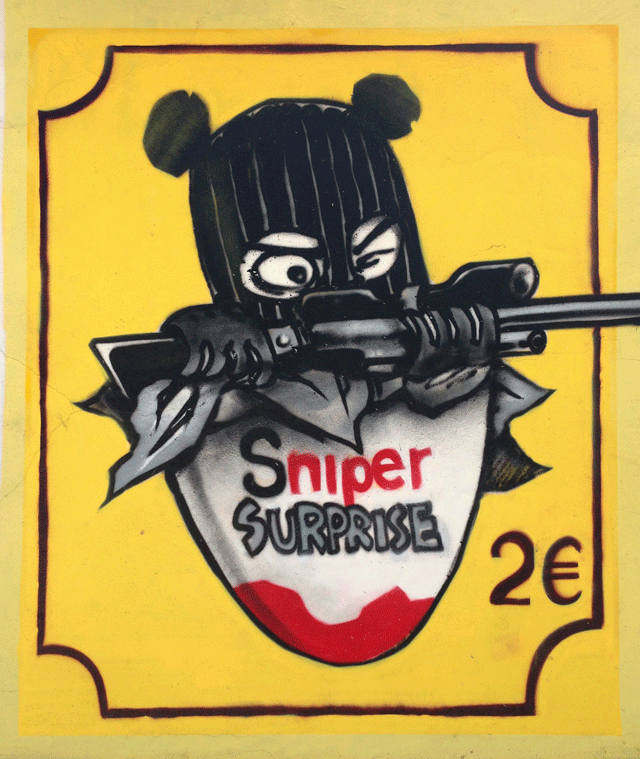
Two euros.
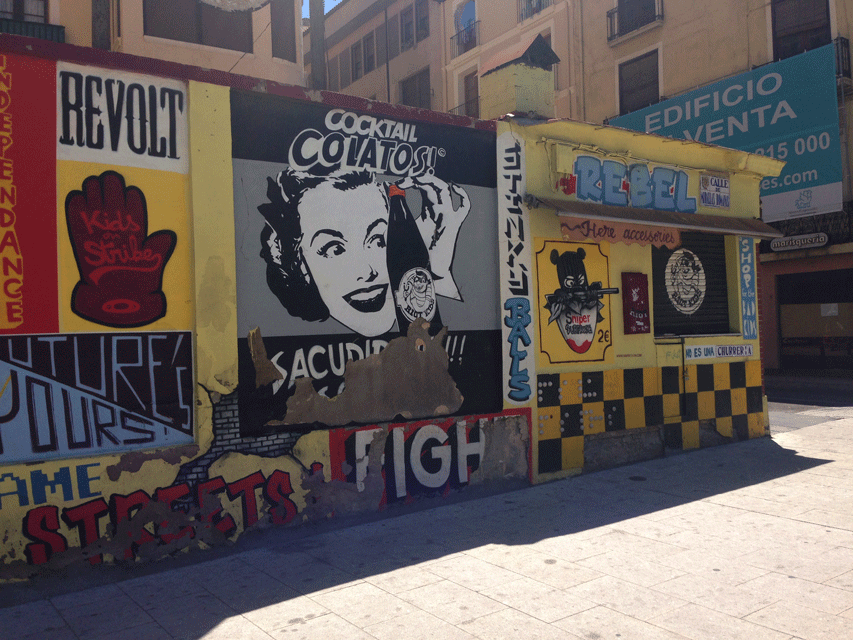
Context: Zaragoza, Spain. As far as I can understand, this is a municipal art project, somewhere between graffiti and public artwork.
